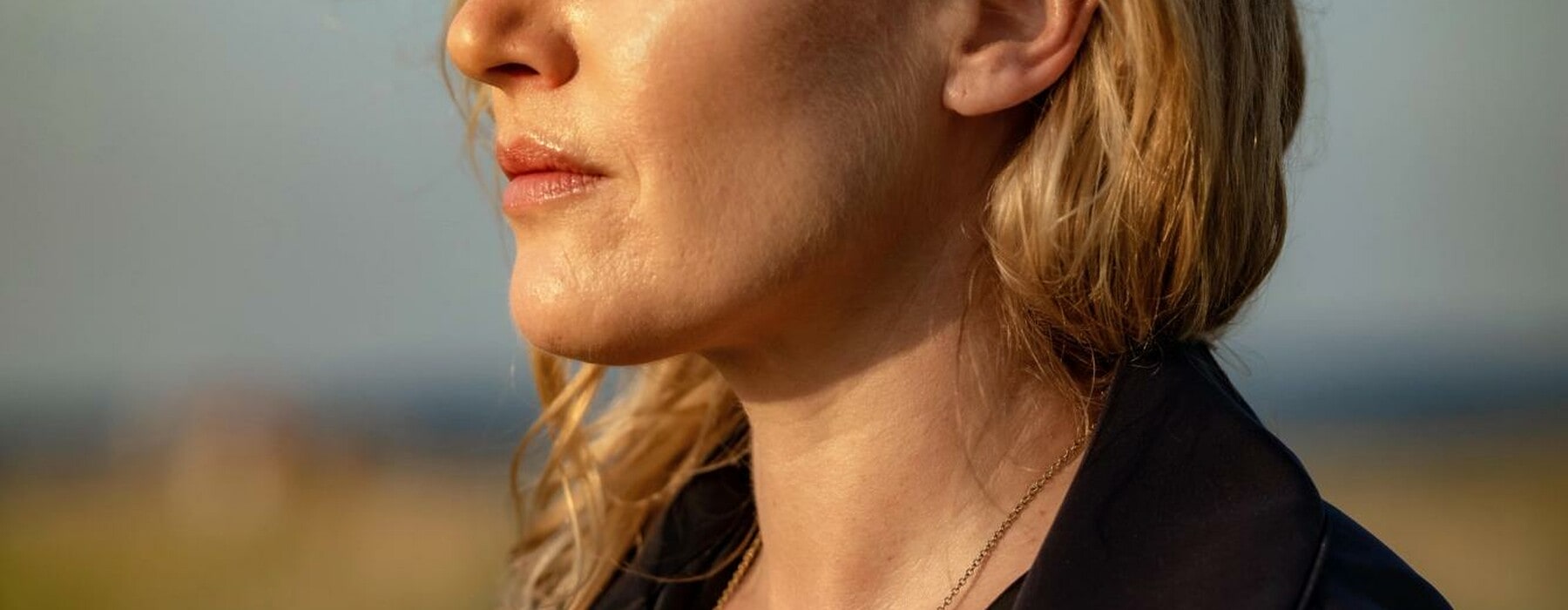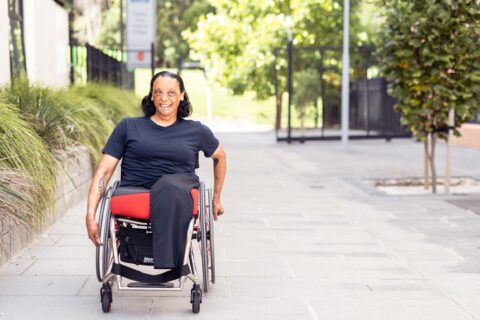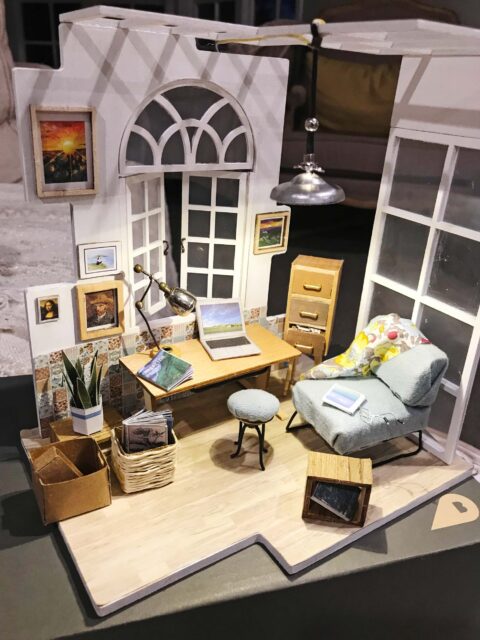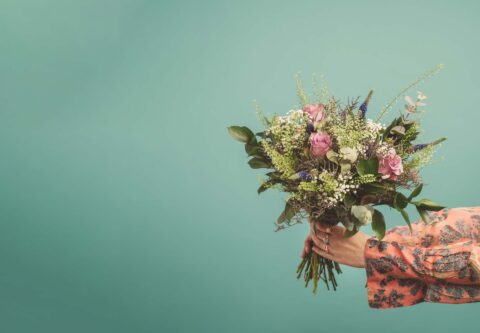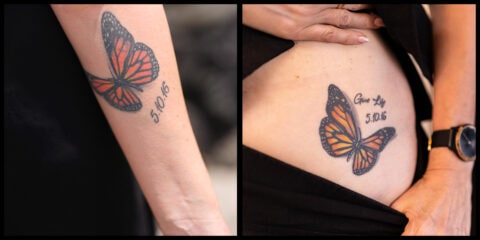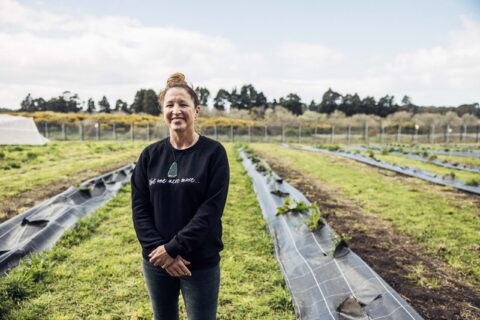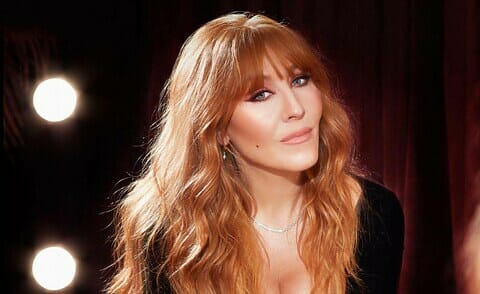The Academy Award winner talks to Eva Wiseman about facing down misogyny in film, strange lockdown habits and the unexpected joys of fossil hunting.
A man is adjusting the angle of his laptop.
“Hello!” he waves. Is that a dishwasher behind him? A little wooden knick-knack, painted with “Let’s Dance” in a jaunty font, balances on an Aga cooker. I have landed in a cheery, overlit garage somewhere on the south coast of England. And then the nice man moves to the side and, bloody hell, there’s Kate Winslet. Movie star Kate Winslet – “Hiya!” – in a smart black jacket with her hair tied back, and that famous smile where it looks like she’s trying not to laugh at a filthy joke.
The nice man is her husband, Ned Abel Smith (formerly Ned Rocknroll) and the garage is their “little barn”.
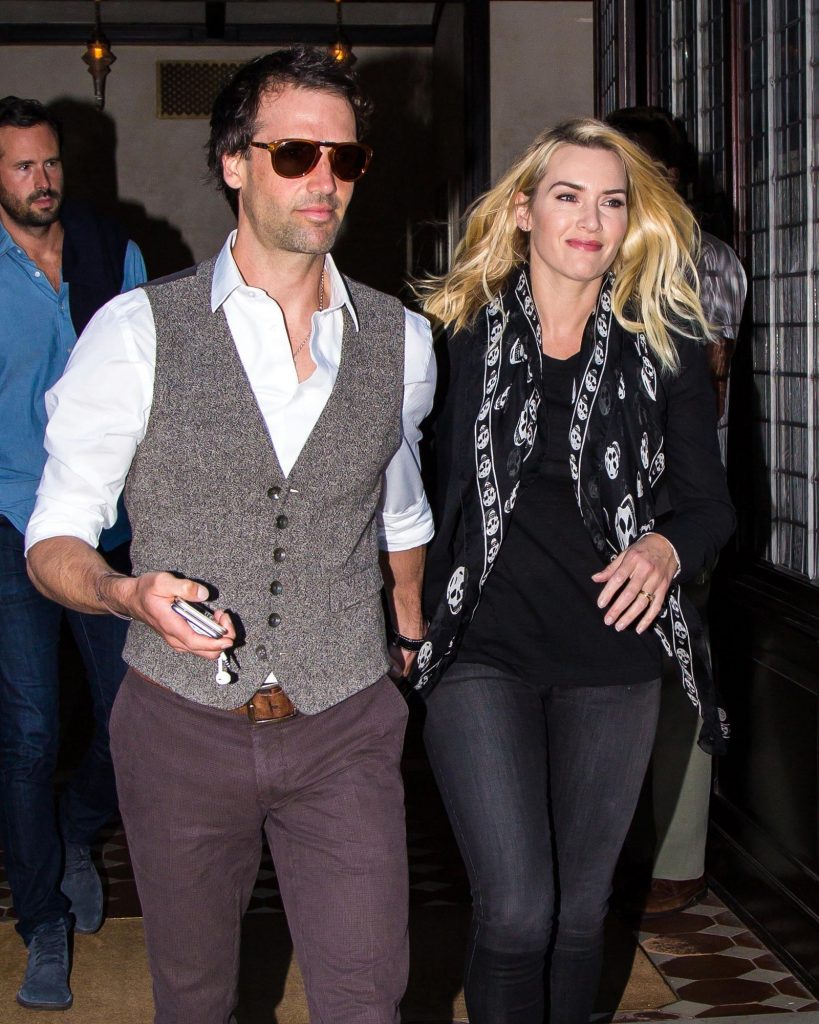
“It’s not actually a particularly nice little barn,” Kate says, her energy very much that of a kindly lady doing your bra fitting at a department store – I like her immediately. “But over here, can you see the amazing sink? That’s from the set of Mildred Pierce. It’s got s*** taps. But I do like to try to take a little something from my films. I took all the curtains from the cottage in The Holiday…”
Her children – Mia, 20 (her daughter with her first husband Jim Threapleton), Joe, 16 (from her second marriage to Sam Mendes), and seven-year-old Bear (born the year after she married Ned) – keep cutting up the curtains, smaller and smaller, Kate says, “To, like, upcycle their jeans. Also, I did a film called All the King’s Men where Jude Law and I had to do this snogging scene at a table, where we snog, snog, snogged our socks off. And it was so fabulous. As the scene was happening, I kept thinking: ‘I’m going to have to buy this table.’ So I did!”
If she takes a prop home from each of her films, it’s no wonder she needed to build a barn. Now 45, Kate has been working for two-thirds of her life, hopping in and out of Hollywood blockbusters to quickly accept an Oscar – she was the first actress to get four Oscar nominations before the age of 30, winning one for The Reader in 2008 – or make a surreal, existential masterpiece (Eternal Sunshine of the Spotless Mind in 2004), or dedicate one of her BAFTAs (her 2016 Best Supporting Actress win for Steve Jobs) to “all the girls who are doubting themselves”, remembering the time her school drama teacher advised her to “settle for the fat girl parts”.
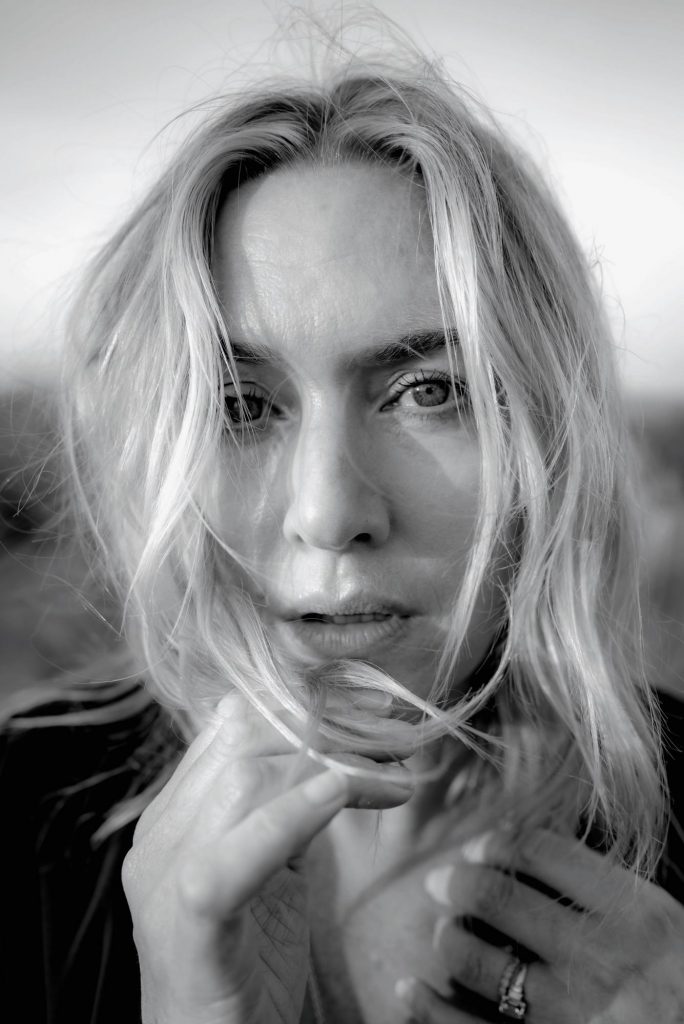
For every part, fat girl or not, Kate has immersed herself in the character entirely – and added meat. Their darkness, their glamour, their anxiety, their breath.
Learning to freedive recently for Avatar 2 – which finished filming in New Zealand last year – she held her breath underwater for seven minutes and 14 seconds, breaking Tom Cruise’s film record.
“God, it’s just wonderful. Your mind completely drifts off. You can’t think about anything, you can’t make lists in your head, you’re just looking at the bubbles underneath you.” Is it dangerous? “Oh yes. You have to have someone there. Ned trained with me and he got quite good at the breath holding as well. But he did… black out.”
What were her first words when she came up for air? “My first words were: ‘Am I dead?’ Yes, I thought I’d died!” she grins, cheerfully.
Though Dorset is not death – not quite – the lengths she went to when preparing for her recent movie Ammonite were similarly extreme. In this quiet, crushing film, writer-director Francis Lee introduces Mary Anning, a 19th Century palaeontologist whose important fossil finds were appropriated by the male scientific establishment.
Like a fossil, Mary’s heart is prized open by Charlotte Murchison (played by Saoirse Ronan), the grieving wife of an amateur gentleman geologist; like a rock, it breaks. Everywhere, there’s death and weather and lust.
In order to “breathe Mary”, Kate moved, alone, to a small windy house – “a bunker” on the beach – in Lyme Regis, where the film is set, spending her evenings drawing and writing by candlelight with a sad bowl of soup, and her days on the cliffs, driving fossils out of rocks with ancient tools while wearing heavy boots. In the rain.
“I was nervous the first time I spoke to her,” says Francis Lee, on the phone from his snowed-in house in Yorkshire. “I knew an A-list star would bring a spotlight to the story – I became obsessed with elevating Mary to a position she failed to reach when she was alive – but to me, the labour of work is important. So I tentatively started to talk about the prep, the research, the manual labour, and Winslet [he calls her Winslet, a little bit camp, hugely fond] just said, calmly, ‘This is what I do.’” He chuckles. He should’ve known. “Her work has always had truth in it.”
Kate spent weeks on the rocks excavating fossils, one of which she polished and gave to Saoirse. She learned to walk differently. She took drawing classes. She cultivated a sodden sort of stillness. One day on set, Francis saw a stranger lurking. He became irritated – who was this woman “bobbing around”? It took a crew member to quietly tell him it was Kate.
“I had to get to know her all over again! She transforms herself,” says Francis. “And – will I say this? Yeah, go on – I do believe this is one of the best things I’ve seen her do. You know, she has no vanity. The only time she commented on the lighting or angles was once when she said, ‘Are you getting my double chins?’”
Looking at Kate today, gently grand in the warmth of her Aga as she recalls Mary, the scramble of the cliffs and the weeks it took to finally scrub the dirt from her nails, I casually refer to method acting. Her face squinches in alarm.
“I hate that word. When I was married to Sam [Mendes], he would always tease me with, ‘You are method’. I have an allergic reaction to wanky ‘process’, so I would hate to ever admit that maybe I do have one myself. But my dad always used to say to me, ‘You’re only as good as your last gig, babe.’”
Kate – whose other recent work includes starring as a small-town detective in the gritty crime series Mare of Easttown, and family drama Blackbird, in which she plays the daughter of a dying woman – has drifted purposefully, ever positive.
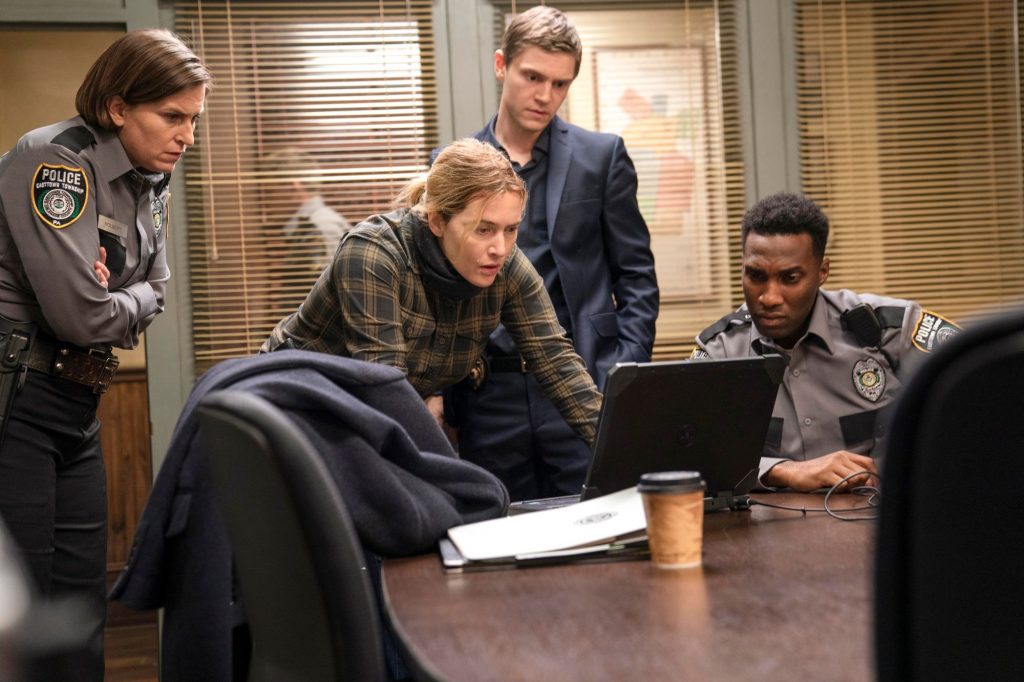
“Do you remember that period in history when suddenly female tennis players became extraordinarily vocal and much more muscular than we’d ever seen them before? Well, I suddenly feel like that’s happening in the acting world. Partly because we are emerging from this spectacular #MeToo period, but also because women are feeling an inherent sense of connection with each other. We’re less afraid to say what we think now.” Has she held back in the past? She sighs. “A little bit. Yes.”
Women are feeling an inherent sense of connection with each other. We’re less afraid to say what we think now
Reading back over her many years of press today, in these perfect and enlightened times, it was a shock to see how often her body was part of the story. Joan Rivers once said of her appearance in Titanic: “If she just lost five pounds, Leo would’ve been able to fit on the raft.”
“Yes. In my twenties, people would talk about my weight a lot. And I would be called to comment on my physical self,” Kate recalls. “Well, then I got this label of being ballsy and outspoken. No, I was just defending myself.”
I got this label of being ballsy and outspoken. No, I was just defending myself
Recently, she returned to some articles written about her in the late 1990s, from when she was 19.
“It was almost laughable how shocking, how critical, how straight-up cruel tabloid journalists were to me. I was still figuring out who the hell I bloody well was! They would comment on my size, they’d estimate what I weighed, they’d print the supposed diet I was on. It was critical and horrible and so upsetting to read. But it also made me feel so… so moved by how different it is now.”
Having grown up in the film world, Kate has particular empathy for women finding their way, says Saoirse, emailing me one night from another film shoot. “Kate’s incredibly supportive of younger actors,” she writes, “which is one of the things I love about her.”
Kate’s daughter Mia launched her own acting career last year, a similar age now to Kate then.
I ask Kate how the physical commentary impacted her teenage self? “It damaged my confidence. I didn’t want to go to Hollywood because I remember thinking, ‘God, if this is what they’re saying to me in England, then what will happen when I get there?’ Also, it tampers with your evolving impression of what’s beautiful, you know? I did feel very on my own. For the simple reason that nothing can really prepare you for that. But then, of course, I had Mia when I was 25, and so all that s*** just kind of evaporated.”
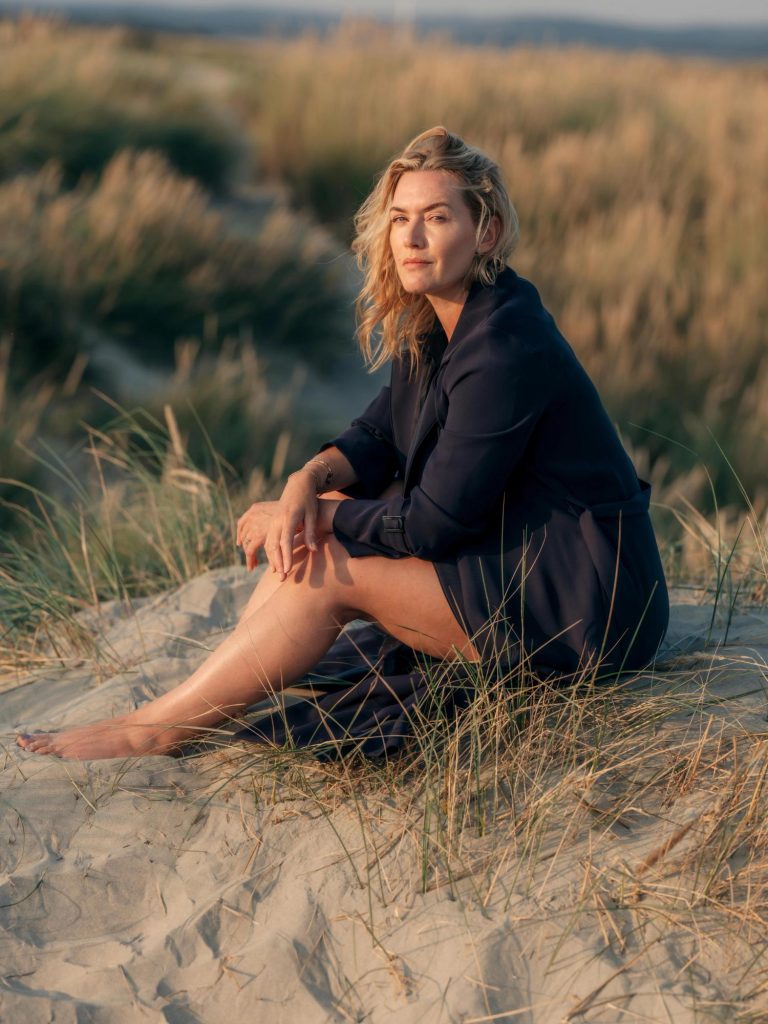
Kate and her family have been joined during lockdown by her father Roger, himself originally an actor; her mother Sally, a nanny, died in 2017. Her death led to Kate investigating her ancestry, discovering her great- great-great-great grandparents were “starving slaves in Sweden” – a film, one day, surely.
At first, Kate luxuriated in lockdown; she was able to sleep properly for the first time in months. But as the weeks ticked away, so did her patience. Now she’s “obsessed with sweeping the kitchen floor. I’ve become completely fixated by it. Why am I the only person who does this? Why am I on my hands and knees again?”
Her sleep, however, has led to vivid dreams. “Last night, I dreamed about getting the vaccine. But the person hadn’t done it properly. And so they took the needle out, and there was still half a vial of vaccine just… squirting. And I thought, ‘Well, now what do we do?’”
She is very aware that, while we’re all in this together, some are more in it than others. Her house is large, her family is safe, the only person close to her to have died is Ned’s 96-year-old grandmother (British magnate Richard Branson’s mother) who, some papers reported, Kate once rescued from a fire on Necker Island in the British Virgin Islands.
She feels lucky, both in her life and her career. “Just so fortuitous. The things I’ve learnt, not just about the craft of acting, but how to think. For instance, with Ammonite, I realised how film has forever objectified women – we do it like we’re breathing. The sense of equality working on Ammonite was so remarkable to me,” she smiles, “the removal of heterosexual stereotypes.”
As Francis developed Ammonite, sewing together what he knew of Mary Anning’s life (in 1811, aged 12, she excavated the skeleton of an ichthyosaur) with what he imagined (a love affair with a woman), controversy bubbled. He responded elegantly, in a series of tweets. “After seeing queer history be routinely ‘straightened’ throughout culture, and given an historical figure where there is no evidence whatsoever of a heterosexual relationship, is it not permissible to view that person within another context?” he wrote. “Particularly a woman whose work and life were subjected to the worst aspects of patriarchy, class discrimination and gender imbalance.”
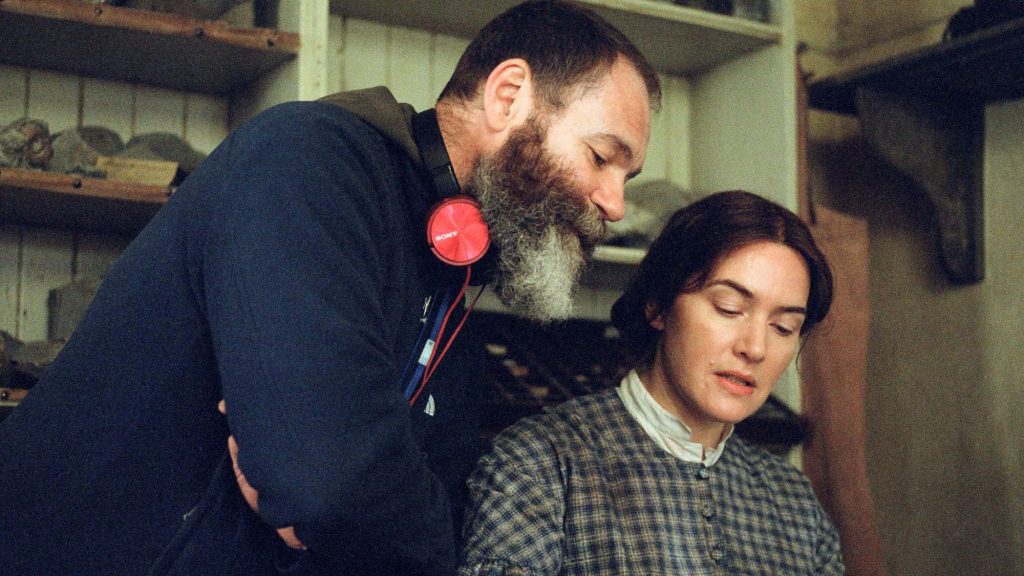
Playing Mary – and meeting Francis – has clearly had a profound effect on Kate, beyond the physical drudge and work. “It made me feel like I had to hold myself accountable for times when I’ve maybe been complicit in the objectification of my own self in film. The things I agreed to, body positions, or the way I was lit or how few clothes I wore.”
She pauses watchfully. “I mean, you haven’t asked me, but I’m choosing to discuss it because we’re talking about the objectification of women. But I’ve been asked so, so many times about the intimate scenes in Ammonite, way more than I’ve ever been asked about any heterosexual love scene before. When I have, it’s been comparisons – how was Leo compared with Jude? So embarrassing, so naff. But what happens with the discussion of LGBTQ+ love scenes is that people actually use different words to describe them.”
“Steamy,” said The Sun, “Saucy,” said Metro – about 90% of the press coverage of Ammonite has concentrated on the sex: how Kate described going down on Saoirse as “definitely not like eating a sandwich”, or how her decision to move their “steamy sex scene” to Saoirse’s 25th birthday was “the greatest present [Saoirse] could have asked for”.
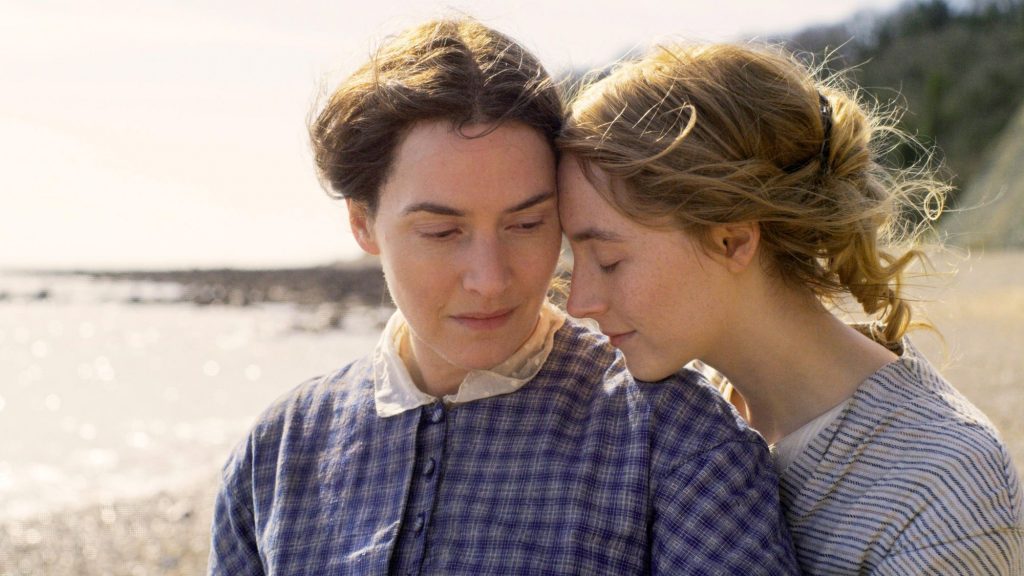
“‘Searingly erotic,’” Kate continues, “‘Titillating’, things that describe the impact the scene might have on an audience, rather than the content of the scene itself. It really pisses me off, actually. What I love about how Francis chose to tell the story of Mary Anning, and her connection with Charlotte, is that he did it without hesitation. The relationship is a part of the story. It’s nothing to do with fear, or secrecy. It’s about two people who fall in love.”
When Helen Mirren interviewed Francis about Ammonite (this is the pitch of buzz surrounding it – Helen, at home in a full look, gushing on camera to a director premiering his second feature), she admitted she’d assumed he was female. “Only a woman would understand that,” she told him. “That pleases me,” he said. “And me,” said Kate.
The character of Mary, she realised after meeting him for the first time, was made of Francis. “This film has made me much more determined to tell the stories of significant historical women,” Kate says. “Susan Sarandon and I had this conversation about how – because men can get their films financed, and with bigger budgets than the girls – as a woman, you have to call in favours from the great creative collaborators you’ve made through your life, whether costume designers or storyboard artists, and ask them to do something for slightly less. It’s made me passionate about having a decent budget to tell your story in an equal way to your male counterparts. For all that has changed, that’s still not improved.”
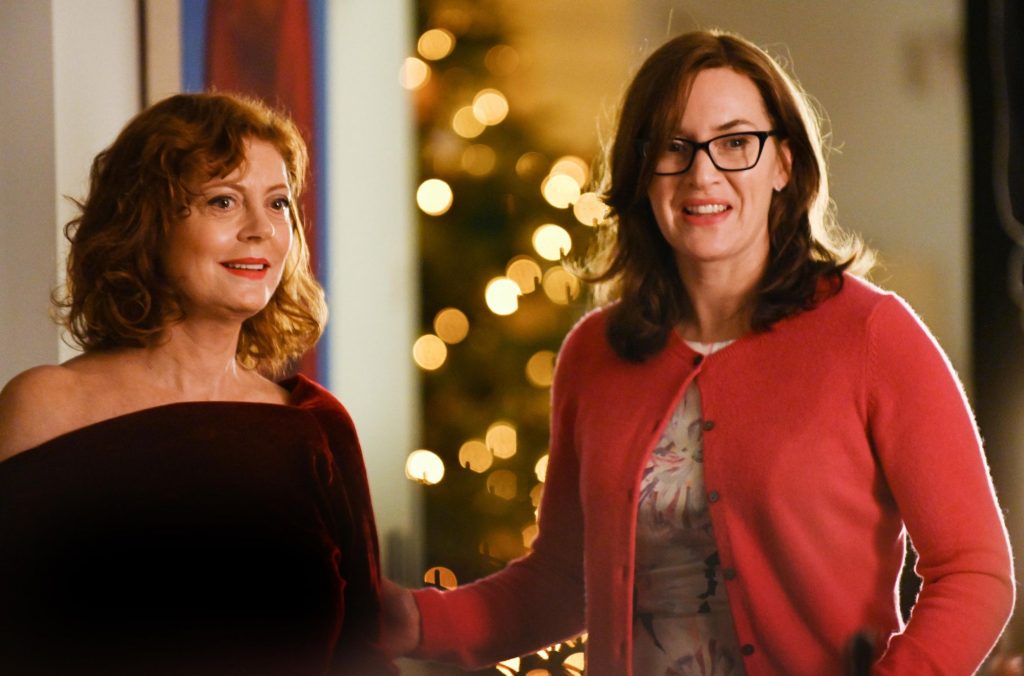
This film has made me much more determined to tell the stories of significant historical women
It’s not entirely true to say this film radicalised her, though Kate does sound like her politics have swerved a little since 2000, when she declared herself “irritated by feminism”.
Something shifted for her in 2017, in a press conference where she was promoting Wonder Wheel, a film she made with Woody Allen. “I realised it was sitting very badly with me,” she says, leaning forward. “I shouldn’t have worked with Woody or Roman [Polanski], and I’ll probably always grapple with those regrets.” She shakes her head. “It’s just unbelievable to me now that those men have been held in such high regard in this industry, and for such a long time. I defy anyone in the acting community to deny that parts in their movies were heavily coveted. And that’s only just changed.”
Has anybody in the industry reacted badly to this admission of regret? “I’ve only said it out loud a couple of times. But yes, they have. There will always be people saying, ‘Well, you did the film, so…’ – but we have to be able to change, don’t we? We have to move forward. Try.”
She raises her chin as if facing the elements, rather than Ned’s little laptop screen and a floor that just will not stay swept.
The expression is familiar. One of the first scenes Kate filmed with Francis sees her gazing upwards. We are on the shingles with Mary, the sea nearby and angry. She has seen something on the cliff face and, readying herself to climb, hikes her skirt into her waistband before clambering up the 200-million- year-old cliff. Reaching, she tugs hard at a rock, then her foot slips and she falls, sliding painfully down to the beach. The rock falls with her and, breaking in two by her feet, reveals an ammonite, cracked.
© Eva Wiseman/The Guardian 2021. Photos: Misan Harriman/The Observer.

